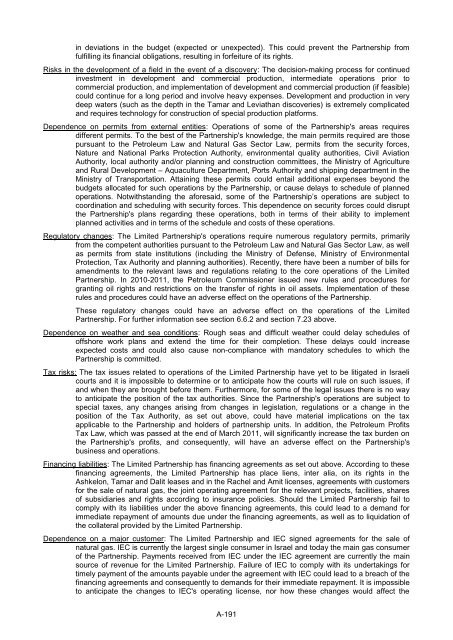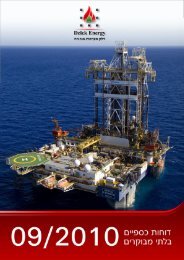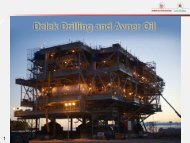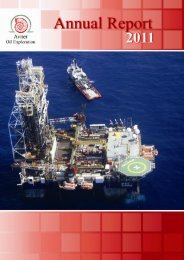Avner Oil - Annual Report 2011 - Delek Energy Systems
Avner Oil - Annual Report 2011 - Delek Energy Systems
Avner Oil - Annual Report 2011 - Delek Energy Systems
You also want an ePaper? Increase the reach of your titles
YUMPU automatically turns print PDFs into web optimized ePapers that Google loves.
in deviations in the budget (expected or unexpected). This could prevent the Partnership fromfulfilling its financial obligations, resulting in forfeiture of its rights.Risks in the development of a field in the event of a discovery: The decision-making process for continuedinvestment in development and commercial production, intermediate operations prior tocommercial production, and implementation of development and commercial production (if feasible)could continue for a long period and involve heavy expenses. Development and production in verydeep waters (such as the depth in the Tamar and Leviathan discoveries) is extremely complicatedand requires technology for construction of special production platforms.Dependence on permits from external entities: Operations of some of the Partnership's areas requiresdifferent permits. To the best of the Partnership's knowledge, the main permits required are thosepursuant to the Petroleum Law and Natural Gas Sector Law, permits from the security forces,Nature and National Parks Protection Authority, environmental quality authorities, Civil AviationAuthority, local authority and/or planning and construction committees, the Ministry of Agricultureand Rural Development – Aquaculture Department, Ports Authority and shipping department in theMinistry of Transportation. Attaining these permits could entail additional expenses beyond thebudgets allocated for such operations by the Partnership, or cause delays to schedule of plannedoperations. Notwithstanding the aforesaid, some of the Partnership’s operations are subject tocoordination and scheduling with security forces. This dependence on security forces could disruptthe Partnership's plans regarding these operations, both in terms of their ability to implementplanned activities and in terms of the schedule and costs of these operations.Regulatory changes: The Limited Partnership's operations require numerous regulatory permits, primarilyfrom the competent authorities pursuant to the Petroleum Law and Natural Gas Sector Law, as wellas permits from state institutions (including the Ministry of Defense, Ministry of EnvironmentalProtection, Tax Authority and planning authorities). Recently, there have been a number of bills foramendments to the relevant laws and regulations relating to the core operations of the LimitedPartnership. In 2010-<strong>2011</strong>, the Petroleum Commissioner issued new rules and procedures forgranting oil rights and restrictions on the transfer of rights in oil assets. Implementation of theserules and procedures could have an adverse effect on the operations of the Partnership.These regulatory changes could have an adverse effect on the operations of the LimitedPartnership. For further information see section 6.6.2 and section 7.23 above.Dependence on weather and sea conditions: Rough seas and difficult weather could delay schedules ofoffshore work plans and extend the time for their completion. These delays could increaseexpected costs and could also cause non-compliance with mandatory schedules to which thePartnership is committed.Tax risks: The tax issues related to operations of the Limited Partnership have yet to be litigated in Israelicourts and it is impossible to determine or to anticipate how the courts will rule on such issues, ifand when they are brought before them. Furthermore, for some of the legal issues there is no wayto anticipate the position of the tax authorities. Since the Partnership's operations are subject tospecial taxes, any changes arising from changes in legislation, regulations or a change in theposition of the Tax Authority, as set out above, could have material implications on the taxapplicable to the Partnership and holders of partnership units. In addition, the Petroleum ProfitsTax Law, which was passed at the end of March <strong>2011</strong>, will significantly increase the tax burden onthe Partnership's profits, and consequently, will have an adverse effect on the Partnership'sbusiness and operations.Financing liabilities: The Limited Partnership has financing agreements as set out above. According to thesefinancing agreements, the Limited Partnership has place liens, inter alia, on its rights in theAshkelon, Tamar and Dalit leases and in the Rachel and Amit licenses, agreements with customersfor the sale of natural gas, the joint operating agreement for the relevant projects, facilities, sharesof subsidiaries and rights according to insurance policies. Should the Limited Partnership fail tocomply with its liabilities under the above financing agreements, this could lead to a demand forimmediate repayment of amounts due under the financing agreements, as well as to liquidation ofthe collateral provided by the Limited Partnership.Dependence on a major customer: The Limited Partnership and IEC signed agreements for the sale ofnatural gas. IEC is currently the largest single consumer in Israel and today the main gas consumerof the Partnership. Payments received from IEC under the IEC agreement are currently the mainsource of revenue for the Limited Partnership. Failure of IEC to comply with its undertakings fortimely payment of the amounts payable under the agreement with IEC could lead to a breach of thefinancing agreements and consequently to demands for their immediate repayment. It is impossibleto anticipate the changes to IEC's operating license, nor how these changes would affect theA-191





